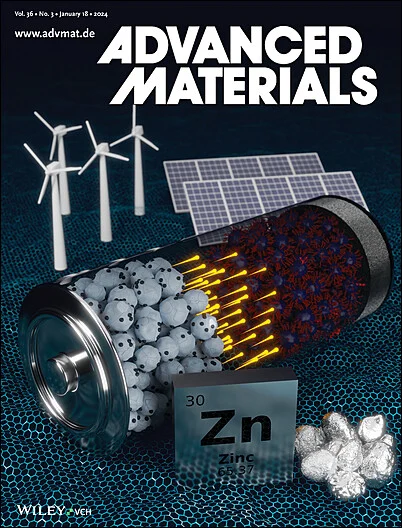增强肠道菌群调节和治疗溃疡性结肠炎的益生菌协同遗传和化学工程研究
IF 27.4
1区 材料科学
Q1 CHEMISTRY, MULTIDISCIPLINARY
引用次数: 0
摘要
活细菌疗法(LBT)通过利用工程微生物来恢复粘膜屏障功能,调节微生物群失衡,增强免疫力,在治疗溃疡性结肠炎(UC)方面具有重要的前景。然而,在恶劣的胃肠道条件下细菌存活率低,难以实现长期定植,治疗靶点不明确等挑战限制了它们的有效性。为了解决这些问题,我们提出了一种结合遗传和化学工程的新方法来调节UC治疗中的肠道菌群。这种策略利用细菌的可编程性和基因编辑来生产动态调节肠道微生态的杀菌剂,并利用受控的化学修饰来增强细菌的耐药性。以大肠杆菌Nissle 1917 (Escherichia coli Nissle 1917, EcN)为模型,研制了一种聚电解质复合涂层,该涂层显著提高了胃肠道细菌的存活率,在胃中提高了40倍,在小肠中提高了74倍。此外,EcN::mcmA被设计成过量产生铁载体微霉素(mcm),其“特洛伊木马”机制靶向和破坏致病菌。在葡聚糖硫酸钠(DSS)诱导的小鼠UC模型中,EcN::mcmA@P/O治疗可有效减少炎症并改善肠道菌群调节,为UC提供了一种有前景且可能更安全的长期解决方案。本文章由计算机程序翻译,如有差异,请以英文原文为准。

Synergistic Genetic and Chemical Engineering of Probiotics for Enhanced Intestinal Microbiota Regulation and Ulcerative Colitis Treatment
Live bacterial therapeutics (LBT) hold significant promise for treating ulcerative colitis (UC) by utilizing engineered microorganisms to restore mucosal barrier function, modulate microbiota imbalances, and enhance immunity. However, challenges such as low bacterial survival under harsh gastrointestinal conditions, difficulties in achieving long-term colonization, and unclear therapeutic targets limit their effectiveness. To address these issues, a novel approach is proposed that integrates genetic and chemical engineering for intestinal flora regulation in UC treatment. This strategy employs bacterial programmability and gene editing to produce bactericidal agents that dynamically modulate the intestinal microecology and utilize controlled chemical modifications to enhance bacterial resistance. Using Escherichia coli Nissle 1917 (EcN) as a model, a polyelectrolyte composite coating is developed that significantly increased bacterial survival in the gastrointestinal tract—40-fold in the stomach and 74-fold in the small intestine. Additionally, EcN::mcmA is engineered to overproduce iron-carrier microcins (MccM) with a “Trojan horse” mechanism to target and disrupt pathogenic bacteria. In a dextran sulfate sodium (DSS)-induced mouse UC model, EcN::mcmA@P/O treatment effectively reduced inflammation and improved intestinal flora regulation, presenting a promising and potentially safer long-term solution for UC.
求助全文
通过发布文献求助,成功后即可免费获取论文全文。
去求助
来源期刊

Advanced Materials
工程技术-材料科学:综合
CiteScore
43.00
自引率
4.10%
发文量
2182
审稿时长
2 months
期刊介绍:
Advanced Materials, one of the world's most prestigious journals and the foundation of the Advanced portfolio, is the home of choice for best-in-class materials science for more than 30 years. Following this fast-growing and interdisciplinary field, we are considering and publishing the most important discoveries on any and all materials from materials scientists, chemists, physicists, engineers as well as health and life scientists and bringing you the latest results and trends in modern materials-related research every week.
 求助内容:
求助内容: 应助结果提醒方式:
应助结果提醒方式:


